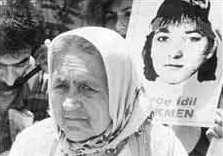
| HOME |
| NERVE |
| REVIEWS |
| ARCHIVE |
| EVENTS |
| LINKS |
| ABOUT US |
| CONTRIBUTORS |
| BACK ISSUES |
| CONTACT US |
 Iraq
human rights! What about our allies?
Iraq
human rights! What about our allies?
By Ozlem Oz
On the 9th of November 2000 the European Union announced the strategy of membership for Turkey to join the European union. Prior to this a meeting had been held in Helsinki on 10-11th December 1999. The conclusion of this was that Turkey, like the other candidates to the EU, must comply with the following criteria:
- the candidate country has to ensure that they comply with the democratic principals of law, human rights and respect for ethnic minorities
- the market economy is alive and can handle the pressure and the competition within the market
- the candidate can carry out their responsibilities within the EU, economically, politically and financially.
The administrative council of Europe decided that Turkey would be given an answer by 2004 at the latest, and that Turkey had to deal with the following major issues: human rights, Cyprus, and in the short-term the Helsinki criteria. Thereafter the UN secretary has to give their support to Turkey. Ozlem Oz discusses how in reality human rights abuses are still a very serious issue in Turkey and how regardless of who is in government it continues.
According to an Amnesty International report on Human Rights in Turkey in 2002 the issue of human rights is still very much on the agenda. The report stated that regardless of who was in power that the ‘Limits on freedom of speech and of the press remained a serious problem’ as the Turkish Authorities still banned or confiscated numerous publications and raided newspaper, TV and Radio offices (Ozgur Radio, YON FM). One particular TV and radio station was banned from broadcasting for 15 years for expressing criticism of the government.
 Added
to this they still restricted freedom of assembly and association. Human
rights monitors, journalists and lawyers were harassed and imprisoned
‘for ideas expressed in public forums’. Branches of several non-governmental
organizations (NGO's) were closed, temporarily or indefinitely, particularly
in the southeast were most of the Kurdish population live. The Government
exerted disproportionate pressure on ethnic Kurdish NGO's in the southeast.
Human Rights Association (HRA) offices in Malatya and Gaziantep were closed
throughout the year. Furthermore, despite their promises to hold the ‘forces
of law and order’ on a rein, the police continued to be a law into themselves
as they beat, abused, detained, and harassed dissidents and demonstrators,
not to mention what was done to people in custody; an Amnesty International
report (2001) and a Human rights Watch report in (December 2002), reported
rape and sexual assault by members of the security forces. ‘During incommunicado
detention in police or military custody, women and men were routinely
stripped naked. Methods of sexual abuse reported included electric shocks
and beating on the genitals and women's breasts and rape’. (Amnesty international
2001).
Added
to this they still restricted freedom of assembly and association. Human
rights monitors, journalists and lawyers were harassed and imprisoned
‘for ideas expressed in public forums’. Branches of several non-governmental
organizations (NGO's) were closed, temporarily or indefinitely, particularly
in the southeast were most of the Kurdish population live. The Government
exerted disproportionate pressure on ethnic Kurdish NGO's in the southeast.
Human Rights Association (HRA) offices in Malatya and Gaziantep were closed
throughout the year. Furthermore, despite their promises to hold the ‘forces
of law and order’ on a rein, the police continued to be a law into themselves
as they beat, abused, detained, and harassed dissidents and demonstrators,
not to mention what was done to people in custody; an Amnesty International
report (2001) and a Human rights Watch report in (December 2002), reported
rape and sexual assault by members of the security forces. ‘During incommunicado
detention in police or military custody, women and men were routinely
stripped naked. Methods of sexual abuse reported included electric shocks
and beating on the genitals and women's breasts and rape’. (Amnesty international
2001).
The Amnesty report does not cover the ongoing issue of the struggle against the F-Type Solitary confinement cells for political prisoners. This has been an ongoing human rights issue with lawyers and human rights activists campaigning as well as the prisoners taking the drastic measure of hunger strike. So far 104 prisoners have died, and government officials have admitted that the attack on the 20 prisons on December 19th 2000 which killed 28 prisoners including 6 women who burned alive was deliberate ‘It had to be done. It was necessary to eradicate the organisations.’ Suat Ertosun.
So it’s interesting to note that all the issues covered above have happened since Turkey agreed to comply with the demands of the European Union Commission. It’s interesting to note that we do not cover the previous 30 years and the treatment of the Kurdish people. It is also interesting to note, that while both the US and UK establishment make much of human rights abuses carried out by the establishment in Iraq, they turn a conveniently blind eye to Turkey.